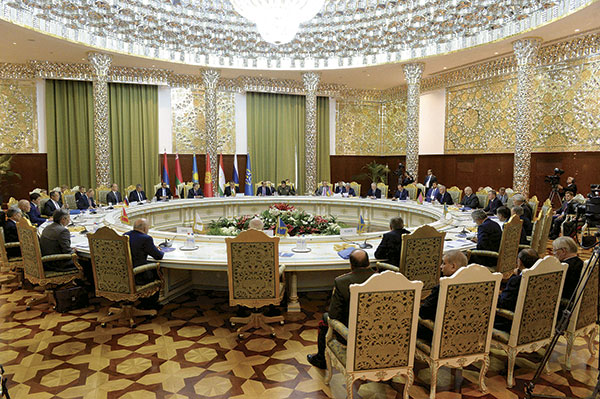
During the plenary session of the CSTO Collective Security Council
Before the presidents began their talks, the National Palace (Kohi Millat) hosted sessions with foreign ministers, defence ministers and the Committee of the Security Council Secretaries. Events of this kind are usually organised some time before the session of the CSTO Collective Security Council to prepare for the meeting of heads of state. This time, it was held just two hours before the key meeting. Ministers discussed the agenda of the following session, in addition to documents relating to joint actions of the operational and military preparation of managerial bodies and force formations of the collective security system. Some aspects dealing with the training of military staff at military higher educational establishments were studied, as well as the co-ordination of the educational and scientific activity of the CSTO member states’ defence ministries.
The presidents talked for a considerable time and Alexander Lukashenko later informed us, “We investigated the most important avenues of our organisation’s development as a group, while amending our plans for the future. We’ve agreed to amend our charter documents immediately and optimise our organisation. The reason for these actions is a constantly escalating situation on the border of the CSTO member states.”
The President stated with regret that all alien states are now required to deal with common risks and threats. A growing level of extremism and the influence of international terrorist groups arouse concern. “Today, we face the escalation of tension in zones of continuing conflict, open warfare and the emergence of new hotbeds of instability, including in the vicinity of our borders. As a result, people are dying, states are deteriorating, people grow poor and an unprecedented flow of refugees and illegal migrants are flooding other countries. Under such conditions, we need to strengthen our military power and the mechanisms of the CSTO anti-crisis management,” he said.
Meanwhile, according to Mr. Lukashenko, much is being done to ensure CSTO security. This year, the work aimed at co-ordinating the organisation’s foreign policy efforts has been effectively continued, primarily with regard to the operation of the Foreign Ministers Council. In addition, the deployment of the collective rapid response force has been worked out. The President is convinced that, in the near future, the CSTO will accumulate some elements of its military component to outline regional air defence systems and peacekeeping forces. Mr. Lukashenko reminded us that, while planning for future action, it’s necessary to rely on the available resources, setting concrete goals that proceed from the real assessment of threats.
“While accelerating the work on the Collective Security Strategy the CSTO will be able to ensure the development of common views on the protection of its interests. The introduction of common standards for defence products, the equipment of CSTO military contingents with unified armaments and material will allow the organisation’s military potential to be greatly increased,” said the President. “Sadly, although we’ve been discussing these issues recently, few concrete measures have been achieved. I believe that the heads of state should honour their commitments in this field, particularly those relating to equipment.”
In his speech to his colleagues, Mr. Lukashenko emphasised his desire to maintain peace in the region. According to his logic, strengthening military power is a reasonable step to dissuade attacks. “Expanding interaction with leading regional and international security bodies should be one of the ways to enhance the CSTO’s potential as a respected organisation, one of the ways to raise the level of trust and reduce tensions in the region and the world,” he added.
As a result of the CSTO Collective Security Council session, a declaration was adopted summarising the results of the 2014-2015 work and outlining proposals for the organisation’s further development. The presidents also signed documents on the system of CSTO troop management, a co-operative agreement in the field of transportation of military and other formations, their movable property and products of military designation, as well as a protocol on the extension of the validity term for the agreement on the establishment of a single system of technical protection for railways. A budget for the coming year was also approved.
This year, Tajikistan presides over the CSTO but, in 2015-2016, Armenia will be at the head. Mr. Lukashenko wished success to his colleagues, and confirmed our country’s adherence to the Collective Security Treaty’s principles and goals.
By Alexander Benkovsky











